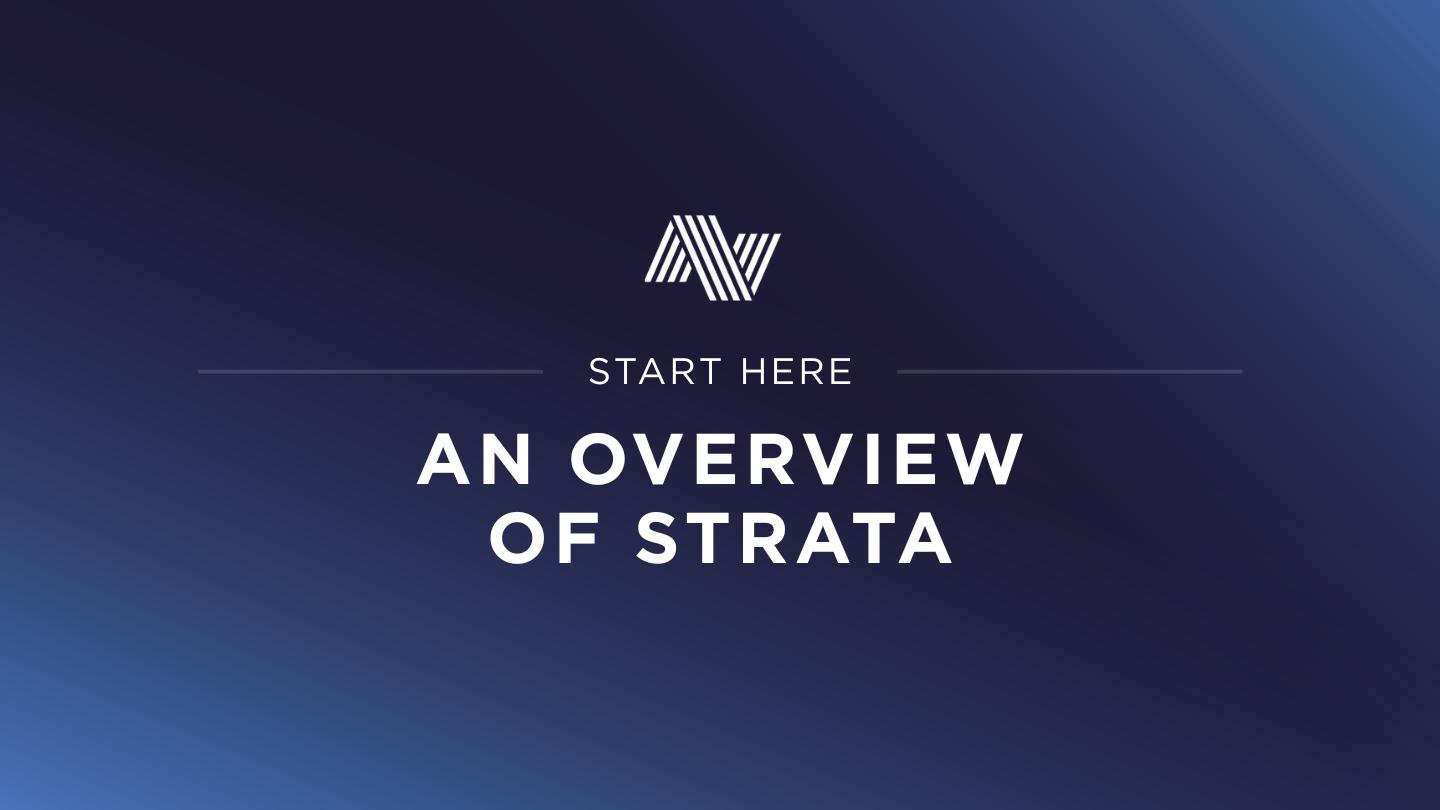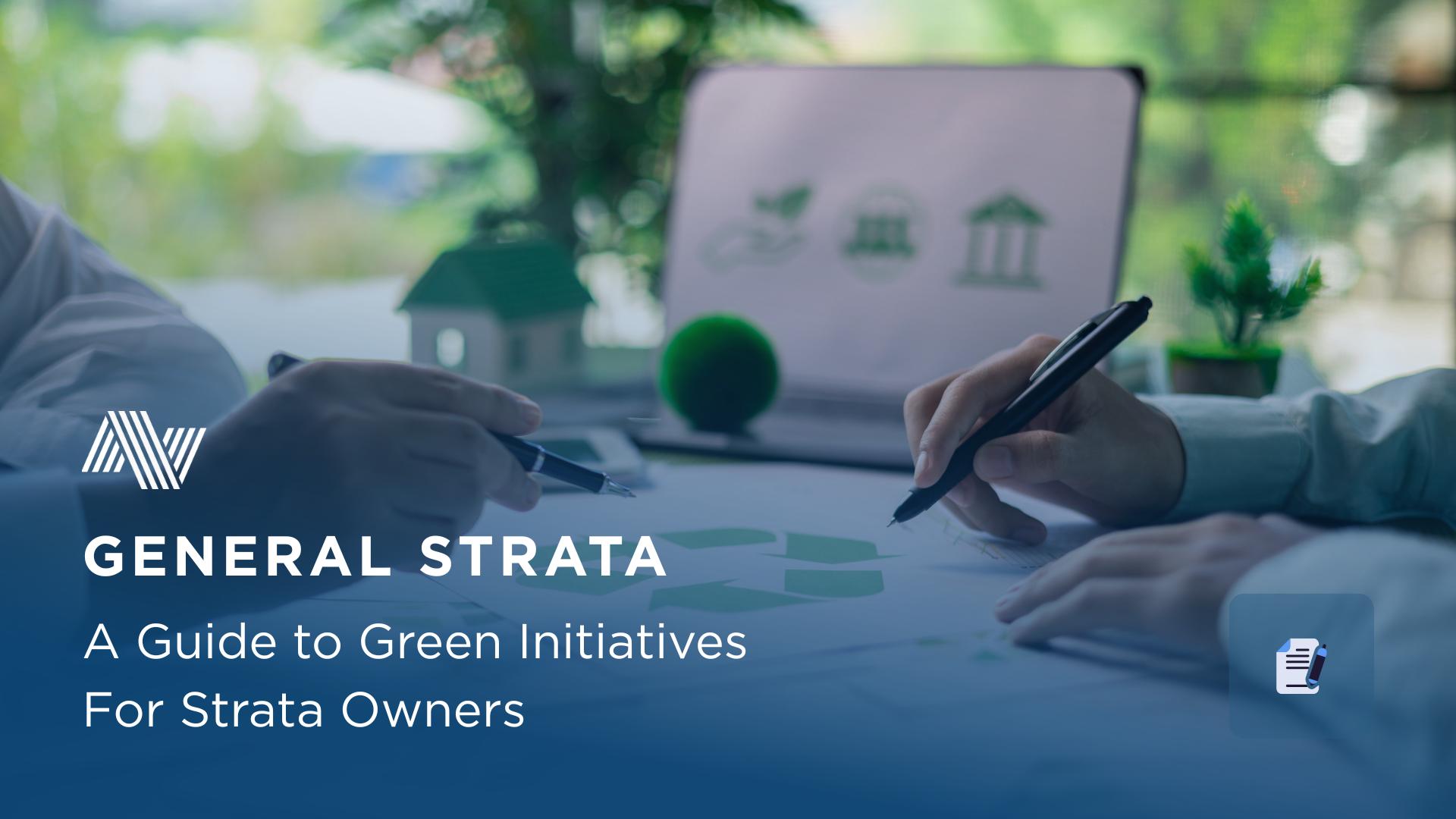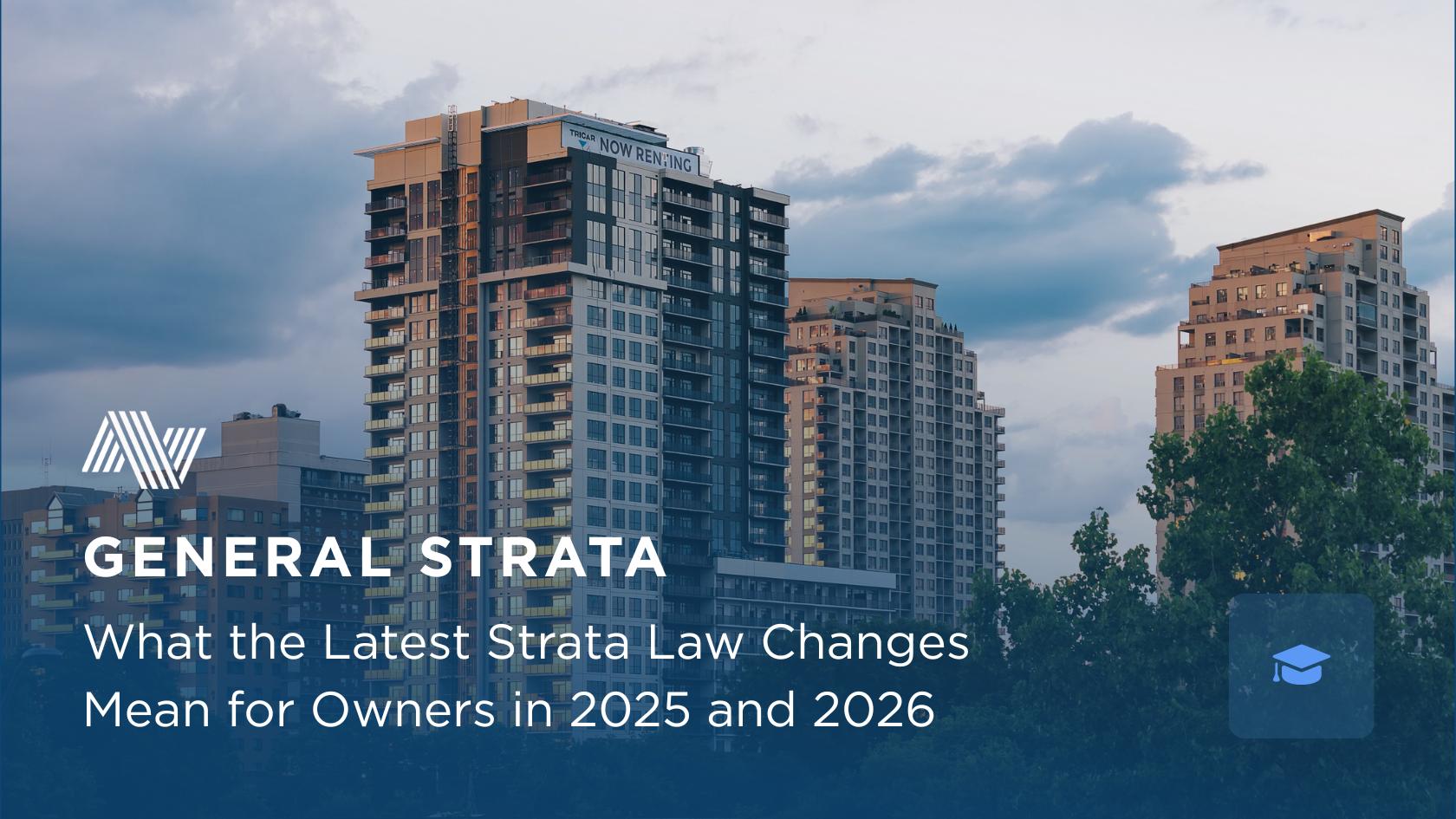Start Here: An Overview of Strata Schemes
Note: This article is intended as a general guide only, and should not be taken as legal or professional advice. It’s essential to consult with a qualified professional or seek advice from your managing agent if you have specific questions or concerns about strata living.


The One-Minute Guide to Strata
If you only read one section, here are the key takeaways:
Strata Schemes – You own your individual lot and share ownership of common property (gardens, roofs, foyers, lifts).
Stakeholders – Lot Owners (members of the Owners Corporation), the Strata Committee, Strata Managers, Tenants, and Prospective Buyers all have different roles and responsibilities.
Governance – Decisions are made democratically in meetings; the Owners Corporation is the legal entity; the Strata Committee manages day-to-day matters.
Compliance – Strata schemes must follow by-laws, hold mandatory insurance, and resolve disputes (internally, mediation, or via NCAT if necessary).
Operations – Finances are managed through levies and shared funds; maintenance of common property is essential; strata managers often support the process.
Why It Matters – Understanding strata ensures better participation, compliance, property value protection, and harmonious community living.
Buying into a strata scheme in New South Wales (NSW) can feel complex, especially if you are a first-time owner or new to strata living. Unlike owning a freestanding house, strata ownership involves shared responsibilities, collective decision-making, and compliance with a detailed legal framework.
With more than half of Sydney’s population now living in apartments, and strata schemes making up the fastest-growing form of property ownership in NSW, understanding how they work is essential for owners, buyers, and tenants alike.
While the rules and processes can seem overwhelming at first, once you understand the core concepts of strata governance, compliance, and day-to-day operations, you will be able to participate confidently in your scheme and make informed decisions that protect your property and investment.
This article provides an overview of the key aspects of strata schemes in NSW and points you toward further resources within the Netstrata Learning Portal.
TL;DR: Strata schemes in NSW are a way of owning property where you own your individual lot and share responsibility for common property. Success in strata living stems from understanding three key areas: Core Concepts (governance and decision-making), Compliance (laws, by-laws, insurance, and dispute resolution), and Operations (finances, maintenance, and engaging professionals).
What is a Strata Scheme?
A strata scheme is a system of property ownership where individuals own their lot (such as an apartment, townhouse, or unit) while sharing ownership and responsibility for the common property. Common property can include foyers, gardens, lifts, roofs, driveways, and other shared spaces.
Every owner in a strata scheme is automatically part of the Owners Corporation, which is the legal entity responsible for managing and maintaining the common property on behalf of all owners.
Strata schemes exist to provide a fair and democratic way to manage shared property, spreading costs across all owners and establishing clear processes for decision-making, dispute resolution, and compliance with the law. Today, strata is the most common form of ownership for apartment and townhouse developments in NSW.
TL;DR: A strata scheme enables individuals to own their unit or lot while sharing ownership of common areas, such as foyers, gardens, and roofs. All owners form the Owners Corporation, which manages and maintains the shared property.
Who Are the Key Stakeholders in a Strata Scheme?
Before diving into governance and compliance, it’s important to know who the key players are in a strata scheme and what roles they play.
Lot Owners
Own individual units or lots and share responsibility for common property. Every lot owner is automatically part of the Owners Corporation.
The Owners Corporation
The collective legal body made up of all lot owners. It manages, maintains, and insures common property.
The Strata Committee
An elected group of owners who handle the day-to-day management of the scheme on behalf of the Owners Corporation.
Strata Managers
Licensed professionals engaged by the Owners Corporation to provide administration, financial management, and compliance expertise.
Tenants (Renters)
Residents who lease a lot. While not members of the Owners Corporation, they must follow the scheme’s by-laws and use common property responsibly. Tenants can attend meetings if invited, but only owners have voting rights.
Prospective Buyers
People considering purchasing into the scheme. They need to understand the financial and governance health of the strata before making an investment.
By keeping these stakeholders in mind, you’ll better understand why certain rules, processes, and responsibilities exist – and how they apply differently depending on your role.
TL;DR: Strata schemes involve several key stakeholders: Lot Owners, the Owners Corporation, the Strata Committee, Strata Managers, Tenants, and Prospective Buyers. Each group has different rights and responsibilities, but all influence how the scheme functions.
Core Concepts of Strata Governance
At the heart of every strata scheme is a democratic process that ensures decisions are made collectively and fairly. As an owner, you have both rights and responsibilities within this system.
Meetings and Decision-Making
Owners come together at general meetings to vote on important matters, such as setting budgets, approving maintenance, or changing by-laws.
The Owners Corporation
Made up of all lot owners, this is the core legal entity that manages the common property, arranges insurance, and ensures the scheme complies with NSW strata law.
The Strata Committee
A group of elected owners who carry out the day-to-day functions of the Owners Corporation and make decisions between general meetings.
Who Needs to Know This?
Lot Owners
Essential – you have voting rights, responsibilities in meetings, and a role in the Owners Corporation.
Committee Members
Essential – you must understand governance to make sound decisions on behalf of all owners.
Tenants
Important – while you don’t vote, understanding the committee structure explains how rules and by-laws are enforced.
Prospective Buyers
Useful – knowing the governance setup helps you assess whether the scheme is well-run.
TL;DR: Strata schemes operate on a democratic decision-making process. Owners vote in meetings, the Owners Corporation is the legal entity responsible for common property, and the Strata Committee is elected to handle day-to-day management.
Continue Reading? Explore more about strata compliance.
Compliance: Following the Rules
Strata schemes in NSW are governed by the Strata Schemes Management Act 2015 (NSW) and must follow clear compliance obligations. Some of the most important include:
By-Laws
These are the rules that regulate how owners and residents use their lots and common property. By-laws cover matters such as noise, renovations, and pet ownership.
Disputes and Resolution Processes
Disagreements are an inevitable part of shared living. Strata law provides a pathway for resolution, starting with internal processes, then moving to mediation, and if necessary, applications to the NSW Civil and Administrative Tribunal (NCAT). Breaches of by-laws can also attract financial penalties.
Strata Insurance
All schemes must hold building insurance and other forms of cover, protecting owners against financial losses from damage to common property or unexpected events.
Who Needs to Know This?
Lot Owners
Essential – you must comply with by-laws, understand insurance, and know the dispute resolution process.
Committee Members
Essential – you are responsible for enforcing by-laws and ensuring compliance with legislation.
Tenants
Important – you need to know the by-laws (noise, pets, parking) and how disputes may be resolved.
Prospective Buyers
Useful – reviewing by-laws and past disputes can reveal risks before you purchase.
TL;DR: Strata schemes must comply with NSW law. This includes following by-laws, resolving disputes through processes like mediation or NCAT, and holding mandatory strata insurance to protect the building and owners.
Continue Reading? Explore more about strata compliance.
Strata Operations: Managing the Scheme
Strata living also involves practical, day-to-day operations to maintain the building’s safety, functionality, and financial security.
Financial Management
Owners contribute levies to shared funds that cover repairs, maintenance, insurance, and long-term capital works planning. In NSW, there are usually two main funds:
- Administrative Fund – for day-to-day expenses such as cleaning, gardening, and minor repairs.
- Capital Works Fund – for major costs such as roof replacement, painting, or lift upgrades.
Occasionally, owners may also be asked to contribute to a special levy if unexpected expenses arise
Maintenance and Repairs
The Owners Corporation is responsible for ensuring that common property is well-maintained, including addressing urgent repairs and ongoing upkeep.
Engaging Professionals
Many schemes appoint a licensed strata manager to provide expertise and manage administration, compliance, and finances on behalf of the Owners Corporation.
Who Needs to Know This?
Lot Owners
Essential – you contribute levies and help decide on budgets, repairs, and long-term planning.
Committee Members
Essential – you oversee financial management, approve repairs, and engage contractors.
Strata Managers
Essential – you need to manage the operations effectively on behalf of the Owners Corporation.
Tenants
Useful – helps you understand who is responsible for repairs and maintenance in common property areas.
Prospective Buyers
Useful – knowing how well a building is managed can influence property value and liveability.
TL;DR: The practical aspects of strata living involve financial management (levies are divided into two main funds, with occasional special levies), maintenance and repairs of common property, and often engaging a professional strata manager to handle administration and compliance.
Continue Reading? Explore more about strata operations.
Why Strata Schemes Matter
Strata schemes bring together diverse groups of owners, each with a shared interest in maintaining the value, safety, and amenity of their property. By understanding how your scheme operates, you will:
- Be prepared to participate effectively in meetings and votes.
- Understand your rights and obligations under NSW law.
- Protect the value of your investment and contribute to the success of your community.
Who Needs to Know This?
Everyone
Owners, tenants, buyers, and managers all benefit from understanding why strata matters – it affects property value, safety, liveability, and community harmony.
TL;DR: Understanding how strata schemes work helps owners protect their investment, participate in decision-making, and contribute to a successful, well-run community.
Common Pitfalls in Strata Schemes
New and prospective owners often stumble on these issues:
- Thinking you own the whole property – in strata, ownership is shared, so rights and responsibilities are divided between owners.
- Neglecting the Owners Corporation (OC) – not engaging with the OC leads to missed decisions that affect your property.
- Overlooking levies – underestimating ongoing costs can create financial stress.
- Misreading by-laws – ignoring scheme rules on pets, parking, or renovations often leads to disputes.
- Not checking records – failing to review meeting minutes, insurance, and financials before buying can hide risks.
Next Steps
- New to strata? Continue with Core Concepts to learn more of the basics.
- Want to understand your legal obligations? Explore Compliance.
- Looking for practical guidance? Read more on Operations.
Still have questions about strata living? Contact our team for support and guidance.
Related Files











